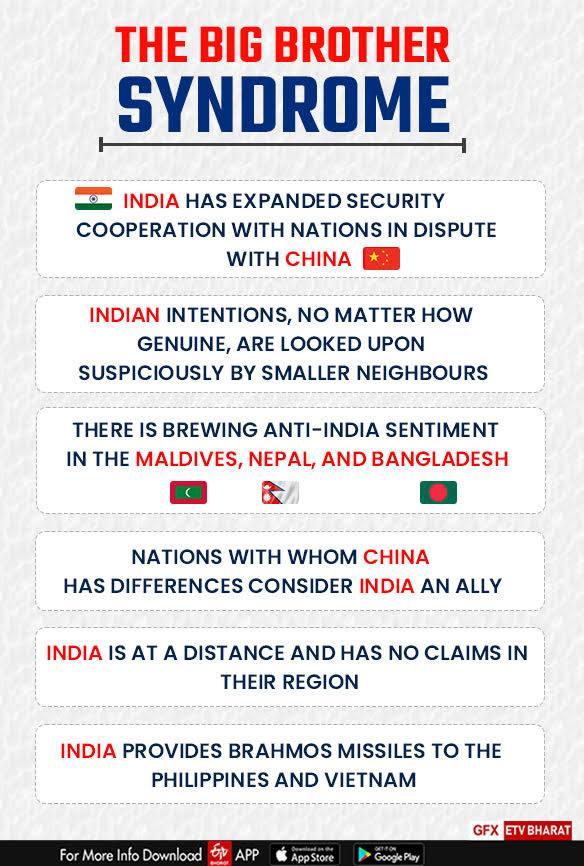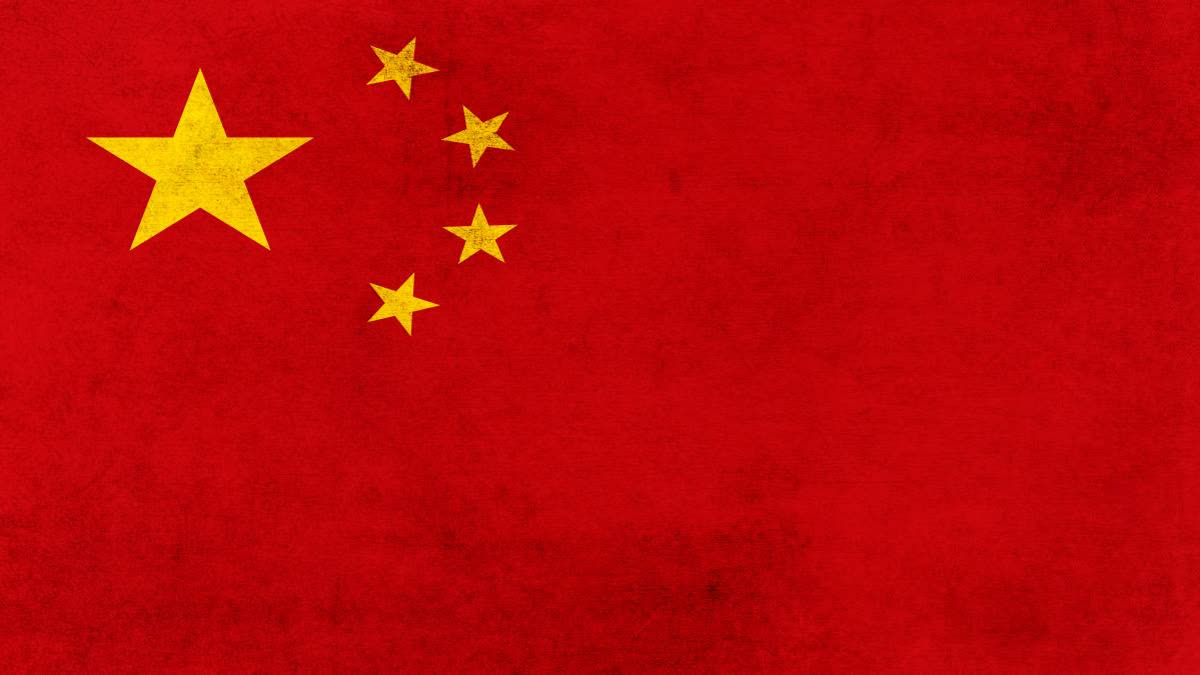China faces tensions with almost all its neighbours. It has disagreements with Taiwan, Vietnam, Philippines, Japan, South Korea, Indonesia and even the small Sultanate of Brunei. Disputes stem from either shoals and islands in the South and East China Seas, Exclusive Economic Zones (EEZ) or on alliances with the US.
Beijing believes that it is defence agreements with the US which provide Philippines and Japan the confidence to challenge its claims within the China designated nine-dash line. With Vietnam the conflict is on its EEZ which is believed to be mineral rich.

For China, reunification with Taiwan has always been a priority. Arming of Taiwan by the US as also visits to it by high-ranking US politicians is an indicator that the US is not adhering to its one-China policy and backing the island in its claim for independence. Beijing had always considered South Korea as a weak link in the US's regional alliance. However, as US-South Korea military ties increase, Beijing's differences with Seoul rise.
Nations with whom Beijing has differences consider India as an ally, mainly because India is at a distance and has no claims in the region. India's relations with nations of East Asia were given a boost post the Ladakh standoff, when Indo-China ties nosedived. Relations are also impacted on the age-old philosophy of 'my enemy's enemy is my friend.'
India's military ties with Vietnam are on an upswing as also it invests in exploring for oil off the Vietnamese coast. India is providing Brahmos missiles to both, the Philippines and Vietnam while being a member of the QUAD, alongside Japan. Indonesia's Sabang port is available to Indian Naval ships for operational turnaround. India has steadily expanded its security cooperation with countries in dispute with China.
Policies of India and China towards their smaller neighbours may be at variance but what remains a global principal is that a large, strong and powerful neighbour is always believed to be a threat to smaller nations in the vicinity. Indian intentions, no matter how good, are looked upon suspiciously by its smaller neighbours, Maldives, Nepal, Sri Lanka and Bangladesh.
Recent comments by the pro-Chinese president of Maldives, Mohamad Muizzu, displays how the nation's population is being fed that India possesses ulterior intentions. A week after India sent non-combatants to Male to take over the functioning of its gifted air assets to the country, a Maldivian portal quoted the President mentioning, 'There will be no Indian troops in the country come May 10. Not in uniform and not in civilian clothing. The Indian military will not be residing in this country in any form of clothing. I state this with confidence.'
The Maldivian government simultaneously signed an agreement with China for military training and 'free military aid' for non-lethal equipment. Turkey has begun training the Malidivian defence forces. Breaking tradition, Muizzu visited China amongst his first official visits, ignoring India.
He also accused New Delhi of bullying, being powerful to which S Jaishankar responded by mentioning, 'big bullies don't provide USD 4.5 billion aid when neighbouring countries are in distress.' The Indian public voluntarily boycotting Maldives tourism has only added to the anti-India sentiment on the islands.
In Sri Lanka, governments are either pro-India or pro-China. Historically, the Sinhalese community continues to blame India for training and arming the LTTE militants in the 1980s. During the war, while India refused to arm the Sri Lankan Army, the Chinese did. Distrust remains as India backs demands of the Tamils in Northern and Eastern Sri Lanka. Some Sri Lankans believe India is interfering in their internal matters.
In 2015, former Sri Lankan President Mahinda Rajapaksa blamed India for his defeat. He mentioned, 'Both the US and India openly used their embassies to bring me down.' In 2018, Sri Lankan President Maithripala Sirisena accused India's Research and Analysis Wing of plotting his assassination. Both without a shred of evidence.
In November last year, Arjuna Ranatunga, Sri Lanka's World Cup-winning captain, accused Jay Shah, secretary of the BCCI of 'running and ruining' Sri Lankan cricket. In Sri Lanka, like the rest of South Asia, cricket is almost a religion. The Sri Lankan government subsequently apologised for these remarks.
On the contrary, India has been supportive of Sri Lanka. During COVID, India supplied more than 25 tons of medicines as also 5 lakh doses of the vaccine. It also provided Liquid Medical Oxygen, kerosine, fertilizers and rapid antigen kits. When Sri Lanka faced an economic crisis in 2022, India opened lines of credit for purchase of petroleum, food items, medicines and fuel.
In November last year, Sri Lankan President, Wickremesinghe, thanked India for the USD 4 billion assistance to the country during its economic crash. He mentioned, 'If we are stable today, it is because of this assistance.' Still within Sri Lanka, the next elections would be fought on a pro-India or pro-China position.
In Nepal, it is common for politicians with pro-China leanings to whip up anti-India sentiments, exploiting the nationalism card. Some deposed PM's have accused India of plotting their downfall, providing no evidence to back their accusations. Differences have cropped up over Indo-Nepal boundaries at Kalapani and Lipulekh, invoking anti-India sentiments and protests.
China, on the other hand has attempted to drag Nepal into its BRI (Belt Road Initiative). Nepal remains hesitant to accept Chinese projects fearing a debt trap. China's envoy to Nepal, Hou Yangi, had created a controversy when she met leaders of Nepal's communist party, intending to break political deadlocks and install a pro-China government.
The current Chinese Ambassador, Chen Song, also tried to interfere in Nepal's investigation into illegal Chinese activity on their soil. However, what created headlines was the visit of the Indian RAW chief to Kathmandu. Despite the fact most of Nepal's trade is through India as also Delhi funds many projects, India is accused of interfering in the country with ulterior motives.
India's size, economy, ability to impose a blockade as also its support to the plains Madhesi population has resulted in an increased anti-India sentiment in the country. This is presently compounded by the Agniveer policy which the Nepal government has not accepted. China is a northern neighbour which has interfered even more brazenly, but possesses lesser linkages with Nepal. Hence, India faces the brunt of local anger.
Opposition parties in Bangladesh have accused India of covertly ensuring continuity of the Sheikh Hasina regime. The latest is the social media call for boycott of all Indian goods. Bangladesh Opposition parties claim India exploited its proximity with the US to tone down criticism of the election process which brought the Sheikh Hasina government back to power.
The anti-India feeling is also being fuelled due to border and water grievances. A Paris based Bangladesh activist stated, 'people with a conscience believe that a government (India) that interferes in (and) helps manipulate the election in another nation and deprives its citizens of their right to vote, is selfish and unethical.' All accusations against India are sans proof.
A similar scenario prevails on likely intentions of Russia amongst erstwhile USSR states in Europe, most of whom are members of NATO, mainly to ensure security. This distrust has risen further since the invasion of Ukraine.
For both, India and China, there is immediate distrust within their neighbourhood. Questioning intent of a neighbourly big brother while trusting a distant power is the norm. For this reason, India's ties with nations in East Asia witnesses a rise, while relations with its smaller neighbours' signals ups and downs. Doubting a big brother is normal.
India has faced distrusts and doubts in its intentions in the neighbourhood regularly over the years, overcoming them every time. The current is no different. As has been seen on occasions, an anti-India government is invariably replaced by a pro-India one and vice versa.


